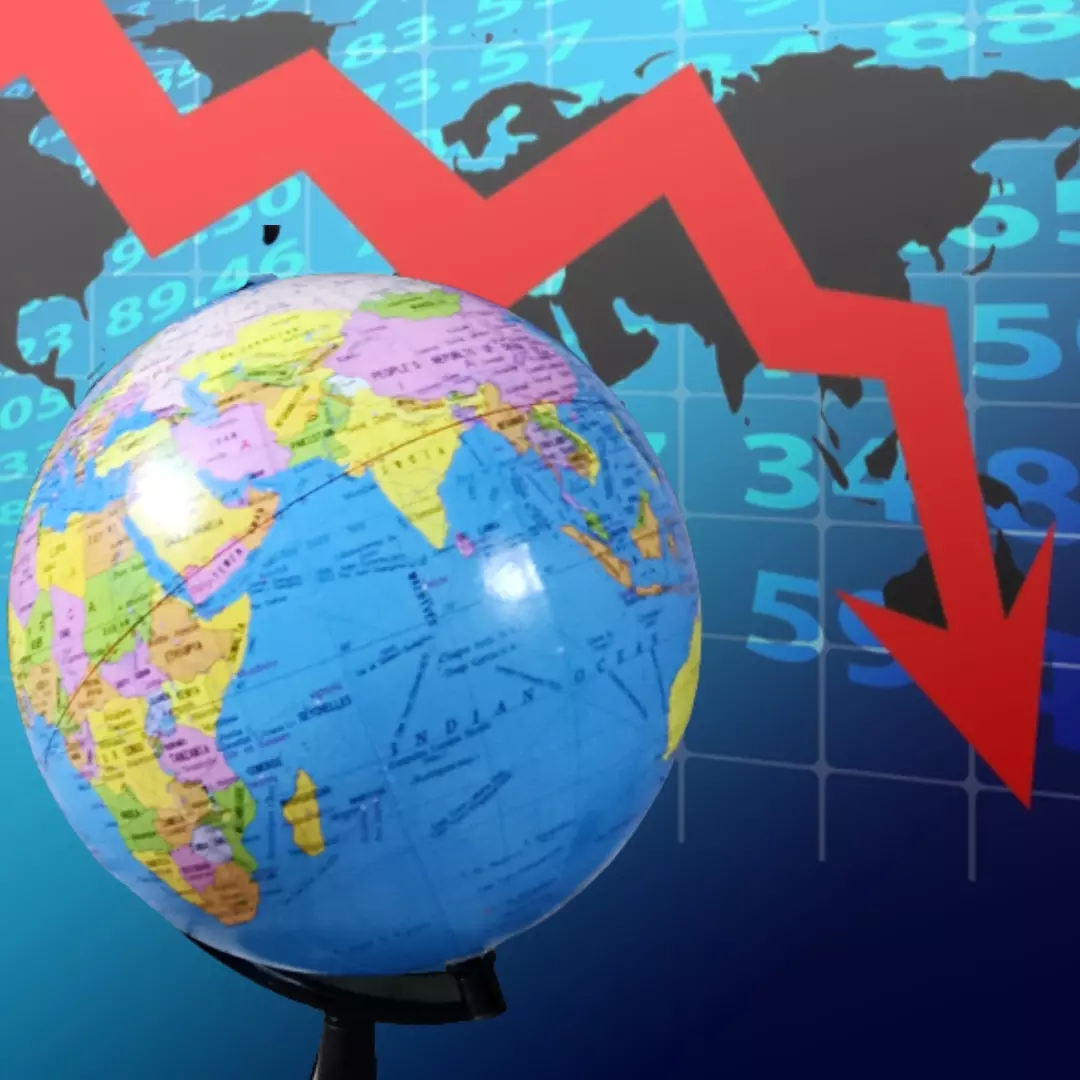The World In 2023: Economic Recovery Across Nations & Political Narratives
India, 28 Dec 2022 11:25 AM GMT | Updated 28 Dec 2022 11:26 AM GMT
Creatives : Ankita Singh |
A literature lover who likes delving deeper into a wide range of societal issues and expresses her opinions about the same. Keeps looking for best-read recommendations while enjoying her coffee and tea.
Guest Author : Joseph Rasquinha
He holds a PhD in Economics from St. Andrews University, Scotland, with 25 years of experience in India, China, Singapore, UAE, and the UK, with two books to his name.
In 2023, the world economy will be totally hostage to politics, and the focus will move to local regions, with everything else being ignored, as most nations will be in survival mode.
As we started 2023, the world expected a sustainable recovery from the devastating COVID pandemic of 2020. Although Europe and the United States are still facing an expected downturn in their economies, relief at the end of COVID was tempered with the realisation that the world still had a lot of work to do to reach the stability and growth of the pre-COVID era.
Having faced the worst of Covid over the last 2 years, with the development of effective vaccines to tide over the worst of the infections, Covid until 3 months ago looked on a downward turn, and 2023 looked like a year of recovery and consolidation. But no one considered politics a serious disruptor, with policies having such inconsistencies that will affect not just economies but social stability and push 2023 into a year of survival rather than recovery reminiscent of the last two years.
The Effect Of Politics
It's a world of economic dominance. Or so we think. We extol the Bill Gates and the Elon Musk of this world, putting them on a pedestal far beyond a Nobel Prize winner. Almost no one can remember who won the Nobel prizes this year, but everyone knows about Musk, Twitter, or Bill Gates Divorce. The Ambanis and Adanis are feted for being among the richest in the world. However great, the economic power of individuals and businesses is a mirage and subservient to the whims and fancies of policymakers. The actual power is in the political narrative.
We have heard innumerable stories of businesses supporting politicians and guiding policies to their advantage. This is true across the world. It is a collaboration based solely on self-interest, with each party focusing solely on its own advantages. That in itself is not wrong and has happened throughout history. The problem is that the attention of the world at large has been diverted from the 'real' power brokers - the politicians, to the 'perceived' power brokers - the Businesses.
This will cost us badly in 2023 as we cannot differentiate to make corrections or exert pressure towards effective and, most importantly, "sensible" governance to alleviate the myriad of economic and social issues expected to crop up in 2023 due to quixotic policies promulgated from 2021.
Economic Prosperity& Stability
Political activity affects economic prosperity, social stability, investment, growth, wealth, progress, and the stock market. Russia's invasion of Ukraine is not as surprising as everyone thinks, though it is bad timing for the world economy.
Nations are always on the lookout for weaknesses, and Ukraine, by removing its nuclear arsenal and getting no guarantees from NATO, was a plum waiting to be picked. Unfortunately, Russian inefficiencies in their war machine have been exposed. The destruction of Ukraine will continue with Europe facing a fear psychosis of the Russians, and even more determined to find permanent alternatives to Russian oil and gas.
The danger zones of Iran/the Middle East and Taiwan/North Korea are moving forward in an alarming manner. Why alarming? Because when a nation cannot solve its economic and social problems, its politicians look for diversionary measures.
For Iran, it is the Gulf; for China, it is Taiwan, and the trend continues. Most people think this is saber-rattling, as the economic consequences of war would be disastrous. But politics is not about money or even the progress of a nation, but the survival of the power brokers and COVID has made most of them vulnerable to economic and social problems to which they do not have an answer.
Unfortunately, the most danger ahead comes from China. The sudden outbreak of COVID there with a large mutant strain, has taken everyone (particularly the Chinese) by surprise. We don't have much data from China, but if you look at the Indian experience and extrapolate a little bit, you get disturbing results.
The second wave in India is estimated, according to a World Health Organization report, to have killed around 4.7 million Indians and, according to a CEDA report from Ashoka University, badly impacted our economy. India looks stable today and is touted as doing better than the rest of the world. However, the inherent problems under the surface are still waiting to explode in terms of jobs, unemployment, social unrest, the SME sector, and a host of other issues that have not really surfaced, as most sectors have been in survival mode.
But in concrete terms, India has faced its music. China has not. It has less immunity from COVID, and its vaccines are sub-standard. If 4.7 million Indians died from COVID, we can expect at least 5 million Chinese to die. This is a drop in the ocean for a population of 1 billion, but its effects are not demographic. In terms of business or the economy, India would not be as badly affected as China because 55% of its GDP is from services. But with 75% of China's GDP coming from manufacturing or its related services, it's a disaster for their economy. If they continue to have large numbers of COVID deaths, no one will go to China for at least 12 months. This ensures that their policy decisions have ensured a blow to their and the world's economic recovery.
Economic Implications Across Nations
We all knew 2023 was going to be difficult, but till 2 months ago everyone looked forward to a marginal recovery. However, the China debacle is such that it is going to be even worse than thought.
Globalisation over the last 30 years ensured the World became interconnected to the highest degree. However, let us summarise how the regions play out in the current reality.
1. Europe is facing oil, gas, and inflation problems and is unlikely to bother about any other region, apart from paying lip service or making noises of agreement or disagreement without any concrete action.
2. Russia with its Ukraine effort will continue to destabilise its immediate region and will keep threatening the nuclear option to keep all on edge. Oil has sustained its war effort so far, but its economy will face enormous pressure as the war lengthens and sanctions curtail a lot of it.
3. China faces at least 3–6 months of major disruptions and death, and its effect on the world's economies will be even more disruptive. At present, there is no alternative to Chinese goods. Although the world is seriously looking at alternatives, they are all poor substitutes to China, and it will take 2-4 years to develop serious alternatives
4. Iran, with unrest and disillusionment among its population will offer more threats to the gulf to divert attention and revive nationalism. The Gulf is their immediate focus.
5. India looks stable, but has too many problems that are yet to be solved that will crop up as the COVID effect is still not fully seen in the economy, making the country unable to focus on anything apart from its own internal state of affairs.
6. The Gulf looks vulnerable, as with higher oil prices, it is becoming a breadbasket of cash for envious neighbors.
7. The USA looks in better shape than most countries, but it cannot deploy troops after its debacle in Afghanistan, so it is increasingly being viewed as a paper tiger by most countries worldwide, someone to ignore with impunity.
8. Africa, East Asia, and South America are still recovering from COVID and are unable to look beyond their own problems.
Outlook For 2023
So what does this mean for the world economy in a nutshell? In 2023, the world economy will be totally hostage to politics, and the focus will move to local regions with everything else being ignored, as most nations will be in survival mode. We all know globalisation has already collapsed (a recent McKinsey detailed analysis has confirmed it), and the problems in China will accelerate this, with countries depending on their national systems and development with marginal interest in external developments.
Unfortunately, the economic implications of all of this are a double-edged sword! The economies of each country will be better due to local reliance, and stabilisation of regional economies will accelerate. But on the downside, the collapse of globalization, according to a Word Economic focus is very bad for the World's future as globalisation creates jobs, raises output in a country, raises productivity, increases wages, and lowers prices in an economy.
All this leads to higher standards of living. This will all be under risk in 2023. Also, the cushion of an international market for growth will evaporate, minus a few sectors like technology. India faced this through a licence raj and banning foreign products in the 70s and 80s, to great detriment to its growing and living standards.
Unfortunately, the world seems to be heading in the same direction. 2023 looks like a year in which the world is taking quite a few steps back. Politicians will determine how many and how far back; this dependence bodes ill for global economies and economic progress in 2023 and beyond. After all, as a philosopher once said, "It's easier to look backward than to face forward." Most will likely take the easier route.
Also Read: Unprecedented Bomb Cyclone Hits US & Canada, Millions Affected By Winter Storm; All You Need To Know
 All section
All section















